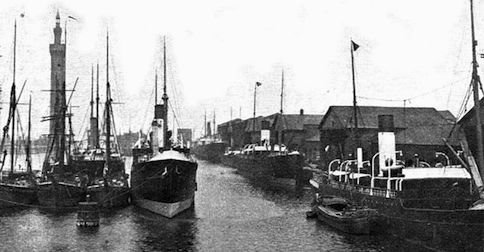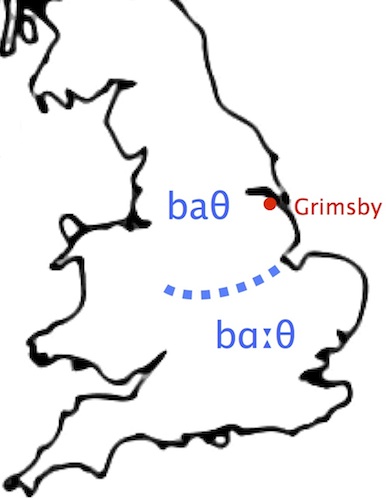Grim Grimsby
 The actor Sacha Baron Cohen is famous for creating and playing a series of outrageous comic characters, each with a distinctive voice. He first came to fame as Ali G, who alerted a wide audience to the dialect that would come to be known as Multicultural London English. His latest creation is Nobby Butcher, from the English port of Grimsby, the working-class antihero of the film Grimsby, US title The Brothers Grimsby.
The actor Sacha Baron Cohen is famous for creating and playing a series of outrageous comic characters, each with a distinctive voice. He first came to fame as Ali G, who alerted a wide audience to the dialect that would come to be known as Multicultural London English. His latest creation is Nobby Butcher, from the English port of Grimsby, the working-class antihero of the film Grimsby, US title The Brothers Grimsby.
The film’s reception has been mixed, and Baron Cohen has received particular criticism for his accent.
Grimsby film: Sacha Baron Cohen criticised for ‘dodgy’ Grimsby accent
Grimsby residents have blasted the accent of Sacha Baron Cohen’s character in his latest controversial film set in the town. Cohen plays Nobby in Grimsby, which debuted in cinemas across the UK today, and the film has received generally positive reviews so far.
According to Grimsby Telegraph reporter Mark Page, ‘None of the accents in the film are Grimbarian [from Grimsby], more just generically northern.’
I haven’t seen the film, but I did hear some of Baron Cohen’s words at the London premiere, where he appeared, in his underpants, as Nobby. Here he is saying there’s no chance… we have cast two black actors:
And, from the film’s promotional material, the reason I get up in the afternoon:
That’s a northern England accent, except that the words chance, cast and afternoon have the long vowel of PALM, as they do in British dictionaries. This is not a general British pronunciation: it’s characteristic of southern England (and of the SSB found in dictionaries). It arose in the eighteenth century, when some words with the TRAP vowel were ‘broadened’ before voiceless fricatives (eg bath, flask) or before a nasal plus a further consonant (eg trance, sample).
This southern BATH-broadening was messy. Bath is broad in the south, but math(s) isn’t. Chanting is broad in the south, but panting isn’t. Trance and sample are broad in the south, but trample isn’t. Sanders is broad in the south, but sand and Anderson aren’t. (This makes it very burdensome to learn for actors or non-natives who don’t already have it in their English. Fortunately it’s no longer required for British newsreaders.)
This diagram shows, roughly, the boundary (or ‘isogloss’) between the traditional pronunciation of the north and the messy broadening of the south: As you see, Grimsby is in the north. We can hear its accent in the BBC Voices resource on the British Library website:
As you see, Grimsby is in the north. We can hear its accent in the BBC Voices resource on the British Library website:
BBC Voices
The British Library Board acknowledges the intellectual property rights of those named as contributors to this recording and the rights of those not identified. Legal and ethical usage ” 2004-11-17 BBC Voices Recordings Grimsby, Lincolnshire Blythe, Marian, 1954 Aug. 04- (speaker, female, nurse and lecturer), Maurier, Jenny, 1947 Sept.
The Grimsby accent isn’t ‘generically northern’. One of its more distinctive features is a front NURSE vowel rather like that of Merseyside, eg the firm I worked for:
Nobby Butcher’s NURSE isn’t front. Here’s they were real:
The real Grimsby accent does share a range of general northern features – including unbroadened BATH words. Here speakers from the Grimsby-Cleethorpes area exhibit a short TRAP vowel in I’ve got the chance and Tom was the last one:
Public-school-educated southerner Baron Cohen is phonetically very gifted. But, whether Nobby was intended to be echt-Grimbarian or generically northern, his broad chance, cast and afternoon are a bit grim.

Strange. I’d have thought that after the STRUT vowel, unbroadened BATH was the most marked feature of northern accents to southern ears.
I’d argue that Ali G isn’t really MLE either. It’s an invented accent (and invented grammar) with some elements of MLE.
BATH=TRAP matters far less than STRUT=FOOT. TV newsreaders can have the former but the latter would be unusual. Even when I was a student in London in the late 70s, southerners often expressed surprise when I told them I was northern, despite my unbroadened BATH. It’s a very non-front realization of BATH-TRAP that’s been more likely to attract southern attention.
Ali G shows that Sacha Baron Cohen had a good ear for what was going on. The accent is an imaginative parody of what he was hearing.
Fair point about SBC’s ear.
Did you have something schwa-like for STRUT, then?
And when you say a very non-front BATH-TRAP, what accent(s) do you mean?
My native accent has no STRUT-commA contrast. When stressed it’s a bit more open; the difference between ‘an orthodoxy’ and ‘unorthodoxy’ is basically a stress difference. (Of course southern accents can also be analysed in this way; this was Roman Jakobson’s view.)
By non-front BATH-TRAP, I simply meant the international [ɐ] of broad ‘Popular Northern’. ‘Notably’ would have been a better word than ‘very’, given that the differences are not so great – and smaller now than they were when RP had [æ~ɛ] for TRAP.
I always assumed that was pretty much [a]. I remember hearing my father describe his own North Manchester BATH-TRAP as ‘flat’ (a word people seem to use for a bewildering variety of vowels), and thinking ‘what you mean is front’. And not just relative to my North London BATH. But I will listen again with fresh ears.
I think your father was using ‘flat’ in the traditional sense referring to the non-front TRAP I had in mind. John Wells, Accents of English, p.134: “in Britain the expression ‘flat A’ tends to be used… to refer to the use of /ʌ/-like realizations of the TRAP vowel.”
John continues, “We shall extend this convenient terminology by referring to flat-BATH accents (with BATH=TRAP) and broad-BATH accents (with BATH=PALM).”
I suspect that your father was thinking more about the difference between his TRAP and southern TRAP (ie his relatively ‘flat A’), while you were thinking more about the frontness of his BATH relative to yours (ie his flat-BATH in the Wellsian sense).
Re flat A and northern TRAP. Wells p.356 describes northern TRAP as “not of the [æ] type, but a fully open vowel somewhere between front and central”. He describes RP /ʌ/ (p.130) as “half open or slightly opener, centralized-back or central”. So a central or nearly central northern TRAP is potentially “/ʌ/-like”.
Wells also quotes (p.291) from a 1978 newspaper article by the rather posh Jilly Cooper: “All those female interviewers talking about bunk bulences and Ufrica. I suppose they all grew up in the Sixties… when… working class became beautiful, and everyone from Princess Unne downwards embraced the Flat A.” When she talks about the Sixties and the working class, she surely has the north in mind, from pop stars to kitchen sink drama.
In my younger day, working-class northern TRAP [a-ɐ] was saliently different from RP TRAP [ɛ-æ-a]. During my lifetime, the ‘standard’ TRAP of the south has edged closer to northern TRAP (not to mention all the northern grammar school types like me with our fully front [a] that didn’t particularly strike southern ears). I remember people using [ɐ] in TRAP words like flat cap, grand, champion, lad, to make a humorous stereotype of the north. I guess one doesn’t hear that kind of thing now, because northern and southern TRAP are now more similar.
So here’s Steve Coogan (Middleton) talking to Armando Ianucci, and Ianucci’s ‘act’ at 3.52 sounds like [a] to me (which is surprising, as I always thought TRAP in most Scottish accents was [ɐ-ɑ]… but maybe he’s not a great example of Scottish as he’s lived in England/America for much of his life). In the minute following this Steve Coogan delivers a bunch of TRAPS (3 of them the actual word ‘trap’!) and there’s quite a bit of variation – to my unprofessional ear it does sound pretty much like the [a-ɐ] you mention above.
Forgot to link…
https://www.youtube.com/watch?v=jKmYLm23pTE
Thanks for this. Armando’s very anglified. Yes, Coogan’s TRAPs are of the kind that would have seemed ‘flat’ relative to RP [æ], but they’re not that far from Jones’s cardinal 4 [a]. You get some backer realizations from Mike Harding (Manchester) and Jake Thackray (Leeds).
https://www.youtube.com/watch?v=OLLQn_Wl8Mw
https://www.youtube.com/watch?v=xod5YAw1_mI
Check out Harding’s balance(d) at 0:32 and 0:37, which can’t be attributed entirely to the following dark L. Thackray’s spoken matters at the start and his sung fancy pantomime (2:00) could be southern realizations of mutters, fun, punt.
(It’s probably no accident that all the words I’ve pointed out start with labials, which darken the sound. It may also be significant that these are old clips. Perhaps northerners have slid forward a bit as southerners have lowered.)
Prounciations such as airly and nairse are common throughout the North East Midlands Dialects, In my local dialect the “first world war” would be “fost wairld waah”. The nurse vowel I guess was air in words like learn and early and word finally as in stir but o in words like first and turn and when the o became too broad for most people the air vowel replaced it as the nearest local equivalent to the standard vowel (and has now usually been replaced itself by the standard vowel).
This was put on the wrong blog entry, Should have been on the one about Grimsby! Apologies.
Прямо здесь вы найдете мессенджер-бот “Глаз Бога”, позволяющий проверить сведения о человеке из открытых источников.
Бот активно ищет по ФИО, используя публичные материалы в сети. Через бота осуществляется бесплатный поиск и глубокий сбор по имени.
Платформа актуален согласно последним данным и включает аудио-материалы. Глаз Бога гарантирует найти профили в открытых базах и покажет результаты за секунды.
https://glazboga.net/
Такой сервис — выбор при поиске людей через Telegram.